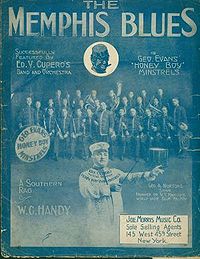
The Memphis Blues
Encyclopedia
"The Memphis Blues" is a song described by its composer, W.C. Handy, as a "Southern Rag." It was self-published by Handy in September, 1912 and has been recorded by many artists over the years.
 Subtitled "Mr. Crump", "The Memphis Blues" is said to be based on a campaign song written by Handy for Edward Crump, a mayoral candidate in Memphis, Tennessee. Handy claimed credit for writing "Mr. Crump", but Memphis musicians say it was written by Handy's clarinetist, Paul Wyer. Many musicologists question how much "Mr. Crump" actually shared with "The Memphis Blues" since the words, taken from an old folk song, "Mama Don' 'low", do not match up with the melody of "The Memphis Blues". Many think "Mr. Crump" was probably the same song as "Mr. Crump Don't Like It" later rercord by Frank Stokes of the Beale Street Sheiks (Paramont Race series, September 1927).
Subtitled "Mr. Crump", "The Memphis Blues" is said to be based on a campaign song written by Handy for Edward Crump, a mayoral candidate in Memphis, Tennessee. Handy claimed credit for writing "Mr. Crump", but Memphis musicians say it was written by Handy's clarinetist, Paul Wyer. Many musicologists question how much "Mr. Crump" actually shared with "The Memphis Blues" since the words, taken from an old folk song, "Mama Don' 'low", do not match up with the melody of "The Memphis Blues". Many think "Mr. Crump" was probably the same song as "Mr. Crump Don't Like It" later rercord by Frank Stokes of the Beale Street Sheiks (Paramont Race series, September 1927).
. Bennett hired professional songwriter, George A. Norton, to write words for it and Evans had his director, Edward V. Cupero, arrange it for his band. Bennett published it a year later but still the sheet music did poorly. Bennett's 1913 publication advertises it as "Founded on W.C. Handy's World Wide "Blue" Note
Melody."
It wasn't until Victor Recording Company's (Victor Military Band, Victor 17619, July 15, 1914) and Columbia
's (Prince's Band, Columbia A-5591, July 24) house bands recorded the song in 1914 that "The Memphis Blues" began to do well.
"Mr. Crump"

New York
Handy first published the song as an instrumental. Handy immediately sold it to music publisher Theron Bennett who took it to New York to attempt to promote it. Handy later claimed he had been robbed. In any case, Bennett convinced George "Honey Boy" Evans to use it for his "Honey Boy" MinstrelsMinstrel show
The minstrel show, or minstrelsy, was an American entertainment consisting of comic skits, variety acts, dancing, and music, performed by white people in blackface or, especially after the Civil War, black people in blackface....
. Bennett hired professional songwriter, George A. Norton, to write words for it and Evans had his director, Edward V. Cupero, arrange it for his band. Bennett published it a year later but still the sheet music did poorly. Bennett's 1913 publication advertises it as "Founded on W.C. Handy's World Wide "Blue" Note
Blue note
In jazz and blues, a blue note is a note sung or played at a slightly lower pitch than that of the major scale for expressive purposes. Typically the alteration is a semitone or less, but this varies among performers and genres. Country blues, in particular, features wide variations from the...
Melody."
It wasn't until Victor Recording Company's (Victor Military Band, Victor 17619, July 15, 1914) and Columbia
Columbia Records
Columbia Records is an American record label, owned by Japan's Sony Music Entertainment, operating under the Columbia Music Group with Aware Records. It was founded in 1888, evolving from an earlier enterprise, the American Graphophone Company — successor to the Volta Graphophone Company...
's (Prince's Band, Columbia A-5591, July 24) house bands recorded the song in 1914 that "The Memphis Blues" began to do well.

